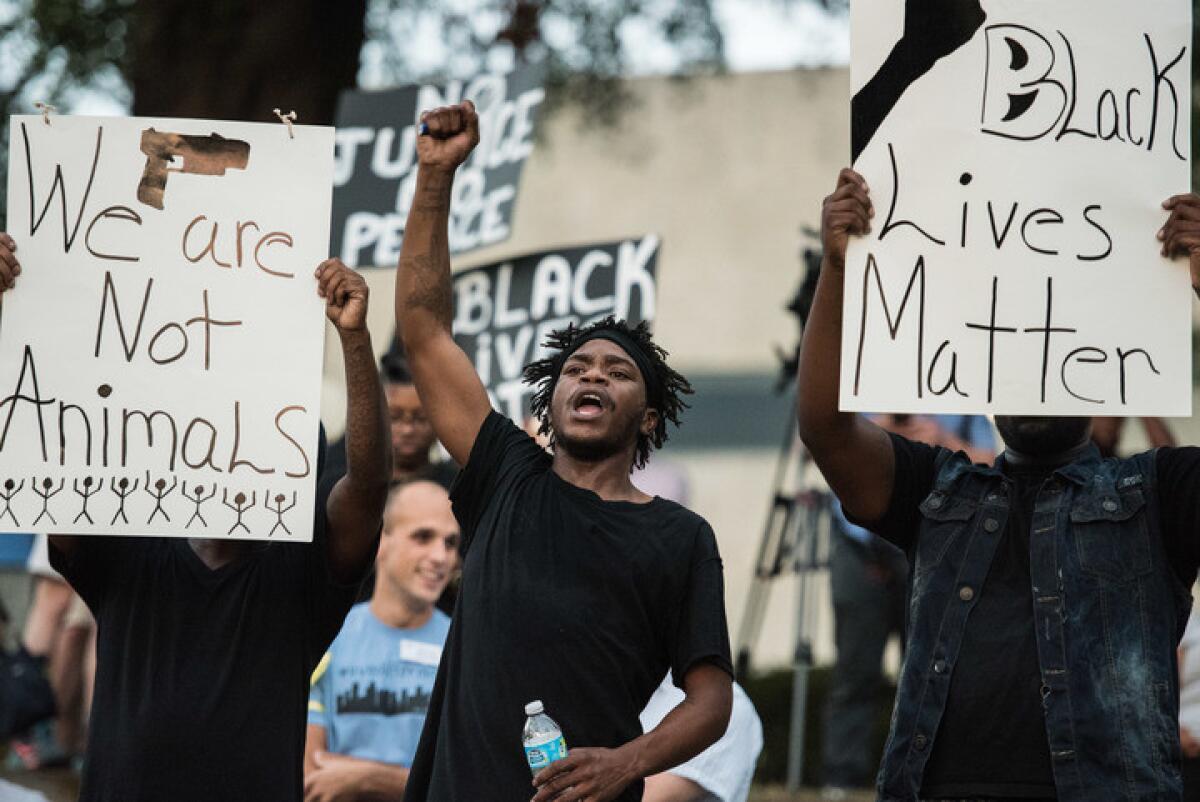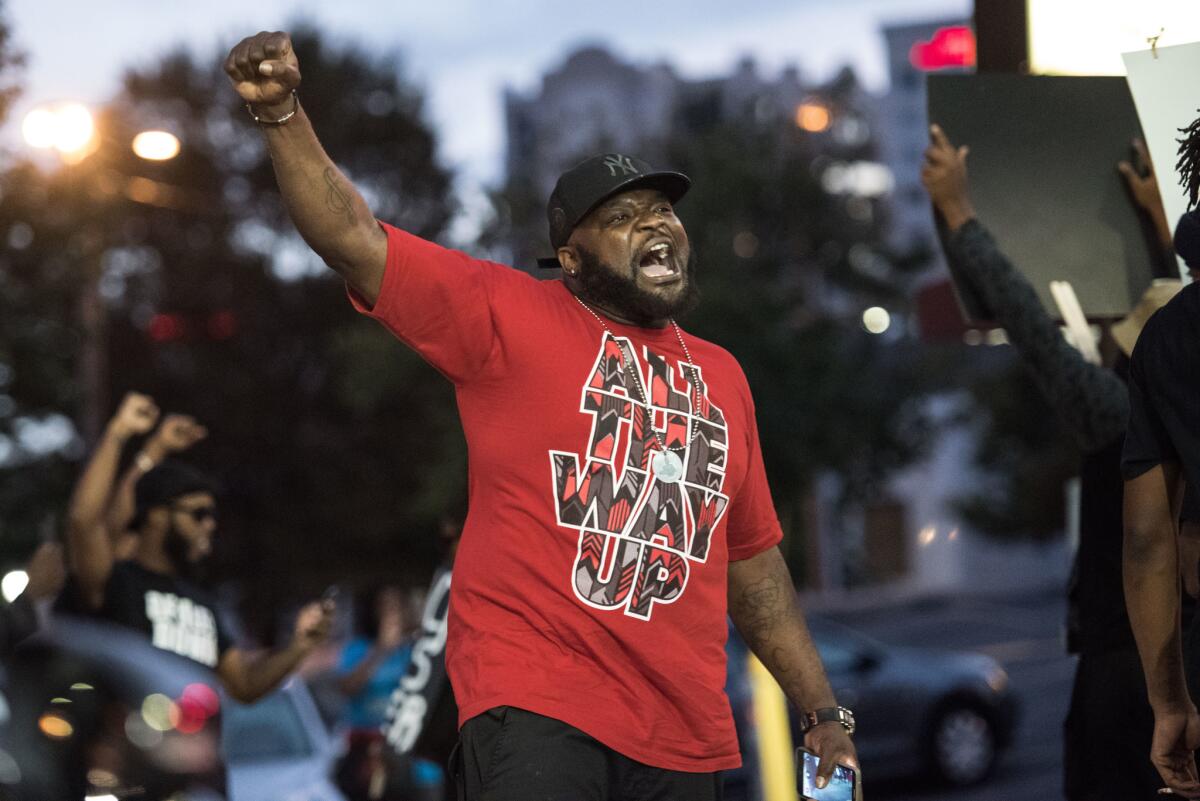Charlotte, N.C., has prospered in recent years, but many black residents have been left behind

- Share via
Reporting from Charlotte, N.C. — Michael Jordan, easily the most famous resident of Charlotte, N.C., was so concerned about the divide between African Americans and police that he donated $2 million this summer to support programs that would foster greater trust.
The donations, split equally between the International Assn. of Chiefs of Police and the NAACP Legal Defense Fund, were aimed at solving a national problem. But Jordan didn’t have to go far to see the need, and this week the entire country watched as Charlotte’s racial tensions spilled into violence.
The violent protests that erupted after police fatally shot an African American man have exposed the rift in this fast-growing community of 800,000 people, which has prided itself on being a diverse and prosperous Southern powerhouse.
Protesters and activists say the police shooting of Keith Lamont Scott on the city’s northeast side was merely the tipping point in growing divisions between white and black, rich and poor, police and racial minorities.
Scott was the sixth person to be fatally shot by Charlotte-Mecklenburg police since September 2015. The others were a Latino man, an Asian man and three black men. With one exception, all the officers involved in the prior shootings were white; the other was black.
“It’s a repeated thing where the cops keep on shooting black people. Nobody can tell you a white person who got shot by police,” said Nicole Blackwell, 24, who was among demonstrators Thursday night in downtown Charlotte, where police faced off in riot gear against demonstrators. “It just keeps happening over and over. At what point is it going to stop? We want equality,” she said.

Before Scott’s death, police-community relations had already been frayed in 2013, when a white officer shot a 24-year-old unarmed man dead after he crashed his car into a residential area a few miles from where Scott died. After the officer’s trial last year ended in hung jury, the state did not retry the case and the victim’s family settled a $2.25-million civil lawsuit.
Police have attempted to patch up their relationship with residents since then, establishing partnerships with clergy and the National Assn. for the Advancement of Colored People to hold forums with community groups and informal meetings in black neighborhoods.
But Scott’s death seems to have put a halt to any progress.
“To the police chief whom we had worked with very closely in the past: Shame on you,” Corine Mack, president of the Charlotte-Mecklenburg NAACP branch, said at a news conference Thursday. In an earlier news conference, Chief Kerr Putney had vowed to conduct a full investigation into the shooting, but suggested that some residents had already discounted the police’s side of the case.
“There’s your truth, my truth and the truth. Some people have already made up their minds about what happened,” he said.
Residents in the city, whose population has swelled over the decade as young professionals and families moved in for jobs in the booming tech, banking and nonprofit sectors, swayed this week between shock and a lack of surprise as storefront windows were smashed, police cruisers were trampled and a protester was fatally shot on a downtown street. Police in riot gear released tear gas and nonlethal grenades into the crowds.
“I don’t condone what’s happening, but I understand it. People are getting more and more frustrated,” said Gerald Johnson, who runs the Charlotte Post, an African American newspaper, and leads Black Lives Matter Charlotte. “Everyone looks at us as this trendy place, this diverse place, this wealthy place. But there is even more poverty with racial division, and the divide is getting deeper.
“The city’s police have been trying for years to have a better relationship with the African American community, but maybe it is not working as well as it could,” said Johnson, 69, a lifelong resident of the city, whose Black Lives Matter group is not affiliated with the national activist organization of the same name.
Johnson said concern over police shootings elsewhere, and a decision by Charlotte’s police chief to not release a video of Scott’s shooting, have only stoked the tensions in a progressive city known as a mecca for middle-class black Americans.
A growing black community makes up 34% of the city’s population, which is close to half white, but African Americans hold a disproportionately small amount of Charlotte’s wealth and have long complained of aggressive policing in their neighborhoods, which dot the west side and poorer east side. The south side is wealthier and whiter; the north side, where Scott was shot, is more mixed and middle class.
Tensions mounted Tuesday night, hours after the officer shot and killed Scott, 43, who was confronted after police arrived looking for another person with an outstanding arrest warrant.
According to police, Scott emerged from his vehicle with a gun and refused orders to drop it; Scott’s family members contend that he was not armed, and was holding a book. The officer, identified as Brentley Vinson, is black, authorities said. He has been placed on leave.
On Thursday, police showed two videos of the shooting to Scott’s family, and the State Bureau of Investigation said it had opened an inquiry into the shooting. The family’s attorneys said in a statement that it was “impossible to discern” from videos whether Scott had a gun and demanded that the videos be made public.
Gene Nichol, a professor at the University of North Carolina in Chapel Hill who has studied race and poverty in Charlotte, said he believed the riots were not only a response to the police shooting but a consequence of growing inequalities in the city that have come with its transformation from a provincial capital to popular location for Fortune 500 companies and skilled workers from across the East Coast and South.
“The city’s poverty rate has almost doubled since 2000. The income disparity is potent,” Nichol said. “About 70% of black households make under $60,000 a year, while almost 60% of white ones make more than that. The median income for white families is 86% higher than blacks and Hispanics.
“The poverty is concentrated and racialized. Charlotte has had probably the fastest rising concentrated poverty rate among major American cities.”
Ferrel Guillory, director of the Program on Public Life at the University of North Carolina, said the city has also had to deal with scars of segregation. “For a while, it had one of the most desegregated schools systems in the country. But a decade ago, as a result of court action, a federal judge released the Charlotte school system from its previous desegregation order. Now it has one of the most segregated schools systems.”
Robert Dawkins, the state organizer of SAFE Coalition NC, a grass-roots advocacy group set up in 2013 to promote police accountability, said the city and its police force had made some progress in recent years, but there was more work ahead.
After the 2013 police shooting of Jonathan Ferrell, the 24-year-old unarmed black man, SAFE worked with Charlotte police and the City Council to change police policy, pushing for more oversight, police body cameras and officer training in conflict de-escalation and implicit bias.
Dawkins credited the current and former police chiefs, both African Americans, with working with the community to try to change police culture. Police said this week that the officer who shot Scott was not wearing a body camera and was in plainclothes, but other uniformed officers who were with him were wearing cameras.
“There’s a lot of work going on. It’s not the policy that’s concerning so much as the implementation. There always seems to be a difference between policy and practice,” Dawkins said.
Some attempts to hold Charlotte’s police officers more accountable, Dawkins said, have been thwarted by state legislators. After activists were successful in getting city police equipped with body cameras, North Carolina’s predominantly Republican General Assembly passed a law this summer that allowed police to keep video from public release in current cases unless there’s a court order. The General Assembly has also refused to pass a bill that would allow Charlotte to give its police oversight board subpoena power.
“It’s frustrating,” Dawkins said. “Even when the chief’s trying to be progressive, he’s stuck by General Assembly restraints.”
Kaleem reported from Charlotte. Special correspondent Jarvie reported from Atlanta.
UPDATES:
5:45 p.m.: Updated to reflect that protester who was shot has died.
This article was originally posted at 5:05 p.m.
More to Read
Sign up for Essential California
The most important California stories and recommendations in your inbox every morning.
You may occasionally receive promotional content from the Los Angeles Times.












